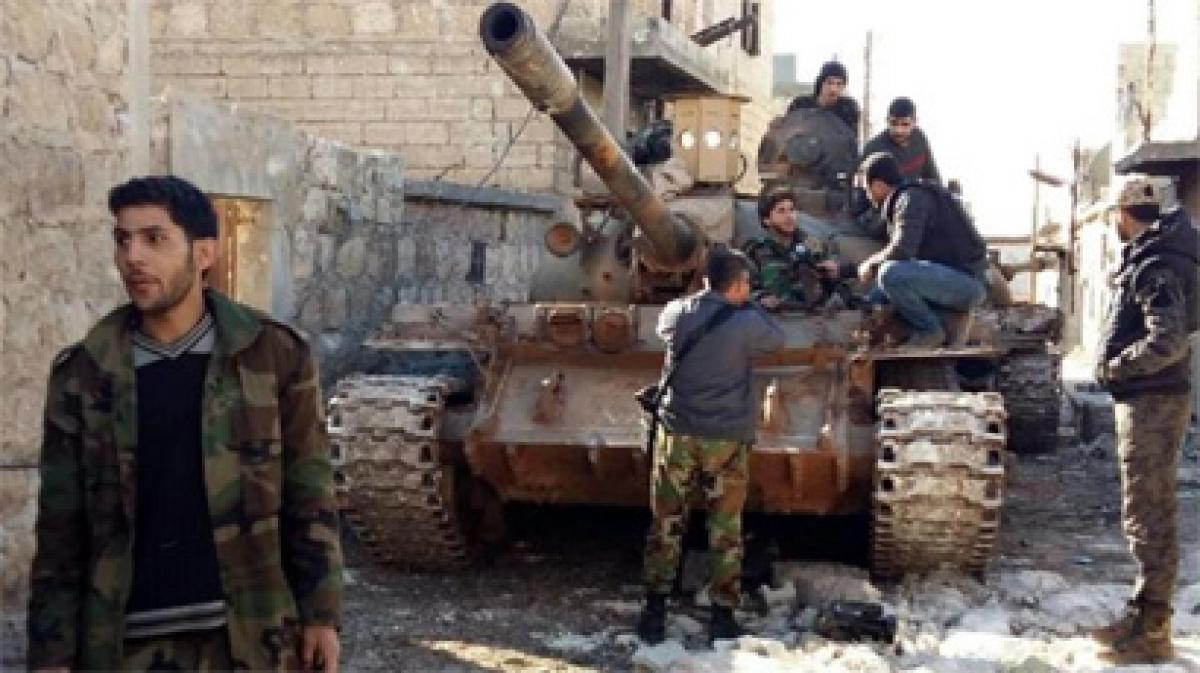Live
- Prateeksha Srivastava says she seldom meets fellow music composers Rusha, Blizza, in person
- Bridal fitness tips by Yasmin Karachiwala
- Scientists develop flexible near-infrared devices for wearable sensors
- Transforming education for the workforce of tomorrow
- Despite global odds, GDP growth at 6-7% good for India
- IIFL Home Fin to raise Rs 500 cr
- Sensex, Nifty drift lower on profit booking
- Jagan treated cadres as ‘subordinates’, alleges Grandhi
- Mpower’s survey on edu loans
- IIP growth falls to 3.5% in Oct
Just In

The US demanded Russia immediately halt its bombing campaign in Syria on Thursday after a bitter breakdown in peace talks exposed the deep rift between world powers aiming to end the five-year conflict.\'
The US demanded Russia immediately halt its bombing campaign in Syria on Thursday after a bitter breakdown in peace talks exposed the deep rift between world powers aiming to end the five-year conflict.'
On the ground in Syria meanwhile President Bashar al-Assad's forces made a breakthrough, entering two Shiite villages that had been under siege by rebels after also advancing around the second city Aleppo.
Syria's state news agency SANA reported "mass celebrations" in the streets of Nubol and Zahraa as people welcomed army troops and celebrated the breaking of the siege.
Peace talks in Geneva were suspended Wednesday until February 25, with UN special envoy Staffan de Mistura saying "more work" was needed.
The talks had been tipped as the most important push so far to end Syria's bloody conflict, which has killed more than 260,000 people and forced half the country's people from their homes.
But French French Foreign Minister Laurent Fabius accused Damascus and Russia of "torpedoing the peace efforts" in Geneva with the offensive.
Russia has been launching air strikes in Syria which it says are targeted at "terrorist organisations" such as the Islamic State group.
Fabius added that world powers would hold "in-depth consultations" on their actions at the aid conference in London.
US Secretary of State John Kerry warned Moscow to halt its bombing of the Syrian opposition in what he said was a "robust" phone call with Russian counterpart Sergei Lavrov.
"We discussed, and we agreed, that we need to discuss how to implement the ceasefire," he added.
UN Secretary-General Ban Ki-Moon said the temporary pause in the talks showed "just how deep, how difficult the divisions are."
At the start of the conference in London, co-host British Prime Minister David Cameron urged a political transition away from Assad in Syria "however difficult that may be."
'Crisis will grow'
The suspension of the talks came as donors gathered in the British capital aiming to raise billions of dollars in aid for Syria and to help its neighbours cope with millions of people that have taken refuge on their soil.
Ahead of the talks, Britain pledged 1.2 billion in aid to be spent between 2016 and 2020 on what Cameron called "the world's biggest humanitarian crisis."
German Chancellor Angela Merkel, under growing pressure over her open door policy for refugees amid Europe's biggest such crisis since World War II, pledged 2.3 billion euros.
Some 4.6 million Syrians have fled to nearby countries Jordan, Lebanon, Turkey, Iraq and Egypt while hundreds of thousands have journeyed to Europe.
Jordan's King Abdullah II told the conference his country of around 6.5 million people had "reached our limit" after taking nearly 1.3 million refugees.
Lebanon's education minister Elias Bou Saab told BBC radio that his nation of four million people had taken 1.5 million Syrian refugees.
"We have been dealing with an ongoing earthquake for the past 4 years," he added.
"This crisis is going to grow, especially after what we heard yesterday when they postponed the peace negotiations."
As well as drumming up aid, the conference will aim to allow more refugees to work in their host countries and boost education.
In an editorial in the Guardian newspaper, Cameron warned that a shortfall in UN funding for Syria "is fatally holding back the humanitarian effort."
"Last year, across the whole international community, only half of the money requested by the UN was raised," he said.
The UN is appealing for nearly eight billion dollars, while regional governments are seeking an extra $1.2 billion.
Organisers have already agreed that participants should at least "double" their contributions from 2015, when they raised $3.3 billion.
Talks deadlocked
De Mistura's brief at the Geneva discussions was to coax both sides into six months of indirect "proximity talks" envisioned under a November roadmap, but problems plagued his efforts from the start.
The opposition High Negotiations Committee (HNC) arrived several days late and reluctantly insisting on immediate steps to allow aid to get through to besieged cities, a halt to the bombardment of civilians and the release of thousands of prisoners.
Riad Hijab, HNC chief coordinator, said late Wednesday the group "will not return until the humanitarian demands are met or (we) see something on the ground."
They were set to hold a final meeting on Thursday before leaving Geneva, a source close to the opposition said.

© 2024 Hyderabad Media House Limited/The Hans India. All rights reserved. Powered by hocalwire.com







